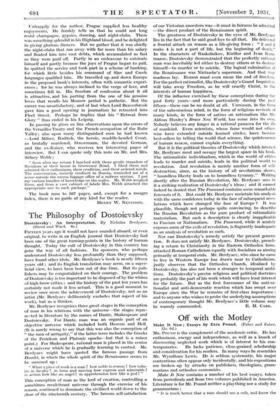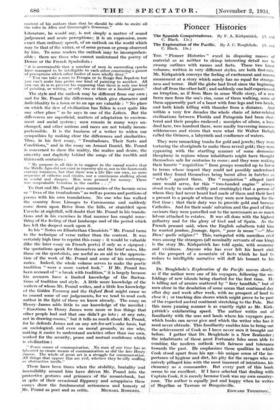Off with the Motley
Make It New ; Essays by Ezra Pound. (Faber and Faber. I2s. 6d.)
MR. POUND is the complement of the academic critic. He has enthusiasm, energy and independence, as well as a knack of discovering neglected work which is of interest to his con- temporaries. He lacks patience, close-grained scholarship and consideration for his readers. In many ways he resembles Mr. Wyndham Lewis. He is seldom systematic, his major contentions often appear only incidentally, and his expositions are broken up by attacks on publishers, theologians, gram- marians and orthodox economists.
Make It New contains a number of his best essays, taken from periodicals and from two volumes published in America. Literature is for Mr. Pound neither a plaything nor a study for grammarians :
" it is much better that a man should use a crib, and know the
content of his authors than that ho should- be able to recite all the rules in Allen and Greenough's Grammar."
Literature, he would say, is not simply a .matter of sound judgement and acute perceptions ; it is an expression, more exact than ordinary speech, of an outlook on the world which may be that of the writer, or of some person or group observed by him. To some readers the outlook may be incomprehen- sible : there are those who cannot undeistand the poetry of Donne or the French Symbolists : " it is ascertainable that a number of men in succeeding epochs have managed to be intelligible to each other .concerning a gamut of ,pereeptions which other bodies of men wholly deny." - ' You can take a man to Perugia or to. Borgo San Sepolcro but you can't make him prefer one kind of painting to another. All you can do is to prevent his supposing that there is only one kind of painting, or writing, or only two or three or a limited-gamut:.
The style and the outlook may be different from our own ; and for Mr. Pound the differences which give character and individuality to a town or to an age are valuable : " No place on which the 'dew of civilization has 'fallen is ever quite like any other place " as he says in one of the Letters. But the differences are superficial, matters of adaptation to environ- ment and social system ; men remain in many ways un- changed, and other nations and races are not totally incom- -prehenSible. It is the bUsiness of a writer to widen our :sympathies by snaking clear the differences and similarities. Thus, in his first essay, " Troubadours, .Their Sorts and Conditions," and in the essay on Arnaut Daniel, Mr. Pound 'is concerned to show the reality, the malice and desire, the sincerity and duplicity behind the songs of the twelfth and
this tecnth centuries : •
" My purpose in all this is to suggest to the casual reader that the Middle Ages did not exist in tapestry alone, nor in the fourteenth :century romances, but that there was a life like our own, no mere sequence of cithorns and citoles, nor a continuous stalking about in sendal and diaspre. Men were pressed for money. There was unspeakable boredom in the castles . . ."
To that end Mr. Pound gives summaries of the laconic razos or " lives of the troubadours" as well as poems and portions of poems with his own translations. No one who has walked the country from Limoges to Carcassonne and suddenly come down upon Brive from the hills, or stumbled upon .I.Tzerche at nightfall, will doubt that Mr. Pound in his transla- tions and in his exercises in that manner has caught some- thing of the feeling of that landscape and of the period which has left the deepest mark upon it.
In his " Notes on Elizabethan Classicists " Mr. Pound turns to the technique of verse rather than the content. It was " certainly high time to reprint this essay : it would be valuable (like the later essay on French poets) if only as a signpost : the quotations speak for themselves and the brief notes, like those on the symbolists, are useful as an aid to the apprecia- tion of the work of Mr. Pound and some of his contempo- raries. Indeed, the whole volume serves to make the poetic tradition " wear a snore varied look." If Mr. Pound has
• been accused of " a break with tradition," it is largely because his accusers have a limited knovdedge of the fluctua- tions of tradition and style. A little more knowledge of the 'writers of whom Mr. Pound writes, and a little less knowledge of the Golden Treasury and the Oxford. Book might cause us
• to amend some of our judgenients, for we tend to read each
• author in the light of those we know already. The essay on ' Henry -James adds little to our knowledge of the novelist : " Emotions to Henry James were more or less things that other people had and that one didn't go into ; at any rate, not in drawing-rooms," but it tells us much about Mr. Pound, for he defends James not on any art-for-art's-sake basis, but on' sociological, and even on moral grounds, -as one who, snaking it easier to understand societies other than our own, worked for the security, peace and mutual confidence which' is civilization : •
" Peace comes of communication. No man of our time has so laboured to create means of communication as did the late Henry , James. Tho whole of great art is a struggle for communication. All things that oppose this are evil, whether they be silly scoffing or obstructive tariffs."
There have been times when the stolidity, brutality and insensibility around him have driven Mr. Pound into the protective gestures and grimaces- of the mountebank, but in spite of their occasional flippancy and scrappiness these essays show the fundamental seriousness and honesty of 'Mr. Pound as poet and as critic. MICILAEL ROBERTS. .















































 Previous page
Previous page